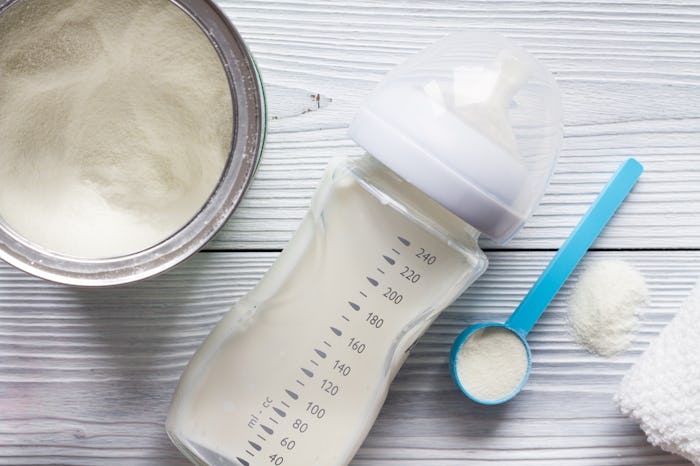As a formula-feeding mom, I'll admit that I rarely gave a ton of thought to the safety of the products I was buying. Because, well, I'd rarely had reason to worry about the safety of most things found on our grocery store's shelves. Thankfully, we never had any issues, but some French parents haven't been so lucky. Earlier this month, French dairy manufacturer Lactalis was informed that 26 infants had become ill from the company's baby formula products, and that they had likely been contaminated with salmonella. Lactalis has since recalled millions of products worldwide, but here's the deal with that huge formula recall, in case you're worried that your baby might be at risk.
According to CNN, the contamination is thought to have occurred at a factory in northwestern France, and may have affected products manufactured as far back as mid-February. As a result, Lactalis has recalled nearly 7,700 tons of formula products in a variety of countries, and French authorities have since published a list of the Lactalis products that can no longer be marketed or exported. Parents have also been urged to stop using any of the recalled products that might be affected, including popular brands like Milumel, Celia and Picot. But worried parents in the United States will be relieved to know that, while the United States is "a major market for Lactalis," according to The Daily Mail, the French health ministry has confirmed that Lactalis products sold in the United States — primarily French and Italian cheese products — are not affected by the recall. Lactalis didn't immediately respond to Romper's request for comment.
In other countries though, the concern is very real. Lactalis baby formula products are sold in Britain, Greece, Morocco, Sudan, Peru, Colombia, Pakistan, Bangladesh and China, among others, and it's unknown just how much of the contaminated product has been sold, or where. But it turns out that not all of the countries that sell Lactalis formula are at risk as a result of the the recall. According to The Telegraph, a spokesperson for the UK Food Standards Agency said that while Britain was listed as one of the countries affected, none of the recalled product was sent to Britain, meaning that parents don't have to worry about having inadvertently purchased contaminated formula.
So far, there have been no reports of children falling ill outside of France, according to The Guardian, and Lactalis has said that all of the 26 infants have since recovered. Yet the effects of salmonella poisoning can be very serious: according to the Mayo Clinic, symptoms can include diarrhea, fever, and abdominal cramps, and further complications like dehydration or bacteremia (a blood infection) can be life-threatening. And given that infants are more likely to develop severe complications as a result of salmonella poisoning, the contamination is especially concerning, since in all of the reported cases, the infants were less than 6 months old.
It's not actually the first time such a wide-reaching baby formula recall has occurred — according to BBC News, six infants died and around 300,000 fell ill in 2008 after formula manufacturers in China were found to have added melamine to their products. In general though, parents in the United States shouldn't be particularly concerned: baby formula is regulated by the U.S. Food and Drug Administration, and its quality standards include required testing for salmonella and other bacteria, like cronobacter.
Of course, that doesn't necessarily mean that contamination can't occur, but on the whole, major issues with infant formula are rare. And given all of the things new parents already have to worry about, it seems that baby formula isn't one that should be added to the list.
